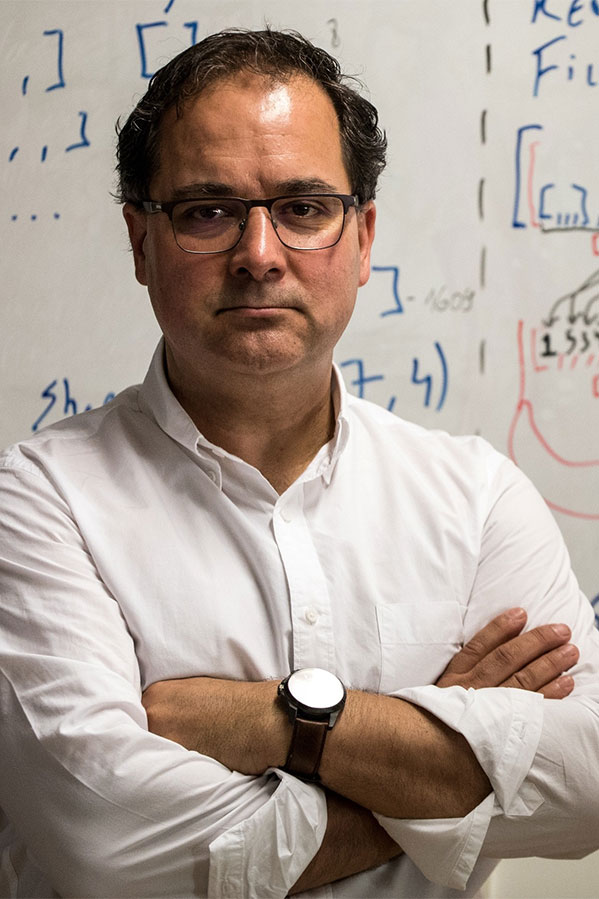Key Staff Member, University of Minho
Paulo Novais
As informatics engineer, his expertise on Artificial Intelligence and other disruptive technologies will apport empirical reflection on regulation patterns CitDig will be able to define.
- Portuguese nationality
- pjon@di.uminho.pt

Summary of relevant skills and experience
Aggregation in Informatics (approved by unanimity – top grade, UMinho, 2011). PhD in Computer Science (UMinho, 2003). Professor (School of Engineering, Department of Informatics, UMinho, lecturing Computer Science, especially AI, to all cycles of study). Director (PhD Program in Informatics) UMinho. Deputy Director (Master in Law & Informatics) UMinho. Former President (APPIA – Portuguese AI Society), 2016-2019. Director (ALGORITMI´s research group “ISlab – Synthetic Intelligence”). Coordinator (Portuguese Intelligent Systems Associate Laboratory). Member (IFIP – International Federation for Information Processing) and Chair (Working Group Intelligent Agent, Technical Committee 12, on AI). Executive Committee Member (IBERAMIA – IberoAmerican Society of AI). PI (Project “PAMWATER – Predictive and Analytic Models for the Optimization of Multi-municipal Water Systems” (2020-2022), FCT funding. PI (Project “RISEWISE – Rise Women with disabilities in Social Engagement”, MSCA-RISE-2015, Marie Skłodowska-Curie Research and Innovation Staff Exchange, 2016-2018). Editorial Board Member [“Ambient Intelligence and Smart Environments”, book series (IOS Press); “Journal of Ambient Intelligence and Smart Environments” – JAISE (IOS Press); “International Journal Progress in AI – PRAI (Springer)]. Supervisor: 11 Post-doc, 17 PhD completed and 10 in ongoing, 77 Masters.
Relevant publication to CitDig implementation
Editor and author of collective book “Interdisciplinary Perspectives on Contemporary Conflict Resolution”, IGI-Global, 2016 (on the causes of diverse conflicts, novel disputes, and technologies associated therein, which provides multifaceted solutions to the myriad of potential arguments and disagreements that arise as part of the human condition); “Conflict Resolution and its Context. From the Analysis of Behavioural Patterns to Efficient Decision-Making”, with Carneiro D./Neves J., Springer-Verlag, 2014 (authors use AI techniques to build a service environment for conflict resolution, describing the approach taken and the experiments performed in the Intelligent Systems Lab of UMinho, and showing the potential advantages of the use of Intelligent Environments, as a way to implement better conflict resolution procedures, in which all the participants have access to more and better information and are able to take better informed decisions); “A new Emotional Robot Assistant that facilitates human interaction and persuasion”, with Rincon J. et. al., Knowledge and Information Systems Journal, Springer, 2018 (authors explore the interaction between humans and sociable robots, which main goal is to provide assistance to older people in carrying out their daily activities – through suggestions or reminders –, displaying human identifiable emotions in order to express empathy (a prototype of the robot is being tested in a daycare center in the northern area of Portugal); “AI and regulating algorithms”, with Freitas P., Report Dialogues between EU and Brazil, Brazilian Federal Government and European Commission, Brasília and Brussels, 30/5/2018 (http://www.sectordialogues.org/publicacao/inteligencia-artificial-e-regulacao-de-algoritmos).
Relevant teaching experience to CitDig
“Conflict Resolution”, curricular unit, Master in Law & Informatics, UMinho (where are studied the “Alternative Dispute Resolutions” – advantages and disadvantages of its transition to virtual environments –, and the role of technology in the systems of in line conflict resolution, assessing the advantages that might ensue and determine whether viability conditions exist); “Ambient Intelligence”, curricular unit, PhD in Informatics and Phd in Biomedical Engineering, UMinho (where are explained the key technologies used in Ambient Intelligence – which puts its users at the centre of a digital environment that is aware of their presence, meeting the needs/habits/attitudes/emotions and providing them with useful services –, according to the relevant technical, social, legal and economic factors involved).
 CitDig
CitDig